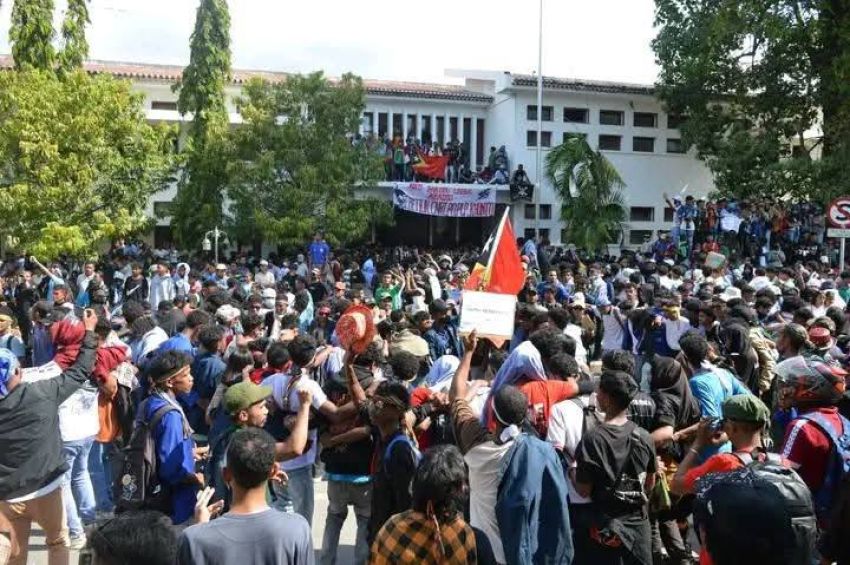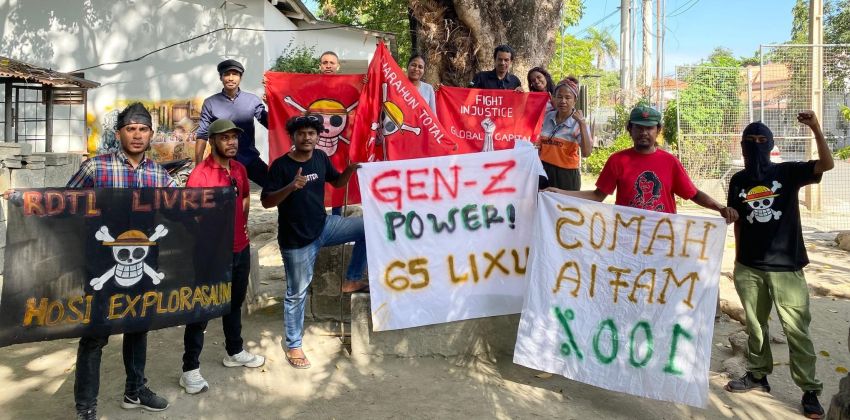
Timor-Leste is the latest country in the Asia-Pacific region to be rocked by Gen Z protests against the corruption of political elites. Over September 15–17, students and other youth took to the streets of the capital Dili demanding that the national parliament reverse decisions to buy luxury SUVs for politicians and high officials and give them generous lifetime pensions.
On the third day, parliamentarians met with a student delegation and promised to reverse the unpopular decisions. President José Ramos-Horta said later in a social media post that he agreed with the demands of the protesters but blamed foreign “undercover elements” for interference and instigating clashes with police, a charge the protesters dismissed as scapegoating.
Youth rallied outside parliament on September 25 to ensure that the politicians kept their promise to repeal the law giving themselves lifetime pensions, which they did, prompting celebrations in the street.
The students have vowed to remain vigilant and organised. "Once again, hitsory shows that when people organise ... they can become a force for change," they said in a statement, reprinted below.
"For some time, the dominant idea was that of the elite, who claimed to be the heroes of this country. Reality shows otherwise, that the real hero is the oppressed people/Maubere."
The repeal of the lifetime pensions has now been promulgated by President Jose Ramos-Horta.
One of the student protest organisers, Konfrontu Vencer, spoke to Green Left about the background to the youth uprising. The interview was translated from Tetum by Tomas Freitas.
* * *
Was this protest only about luxury cars and lifetime pensions for politicians, or was it the spark for broader issues?
Actually, the protest was aimed at dismantling both national and international mafia systems tied to the culture of purchasing luxury cars for members of parliament. Some MPs have enjoyed lavish lifestyles by collaborating with brokers who consistently inflate prices during procurement. Due to weak oversight and limited accountability, many parliamentarians have chosen to participate in this corrupt system for personal gain.
This mafia operates behind the scenes, disguised as legitimate politicians, and has normalised the practice of buying new cars for every new parliamentary term. While the procurement process appears legal, the inflated prices offered by the winning companies raise serious concerns.
The controversy surrounding car purchases has existed for years. In 2024, political parties such as FRETILIN and PLP [Peoples Liberation Party] submitted motions to revoke the budget for luxury vehicles during the general state budget discussions. However, these motions were rejected by pro-government parties. The budget — including funds for luxury cars — was quietly approved, and the public only became aware when procurement began in 2025. This triggered widespread dissent among social movements, NGOs and universities.
Students mobilised to demand that parliament cancel the purchase of 65 vehicles. The protest used the car procurement issue as a symbol of resistance against a broader system of exploitation — national and international — that harms the people of Timor-Leste.
Tensions escalated between students and police, resulting in one car being burned and other vehicles damaged. Students were frustrated by the police, who were supposed to protect us but instead used force. This confrontation caused panic among MPs, who quickly agreed to our initial demands.
Seizing the moment, we pushed further — calling for the repeal of the lifetime pension law and the 100-metre [from parliament, government offices and embassies] restriction on protests. On the third day, parliament agreed to place the pension law on the agenda for discussion on September 25.
So, this protest was not just about cars — it was the result of years of frustration and discontent among citizens toward their government.
What are the living conditions of young people in Timor-Leste today?
Youth in Timor-Leste face high unemployment and a lack of meaningful opportunities from the grassroots to the national level. Many turn to martial arts groups and rituals with unclear objectives, leading to a breakdown in youth productivity. With few jobs available, many young people leave the country, while older generations continue to dominate public institutions.
The quality of life is deeply unequal. The gap between rich and poor is visible, and the future feels uncertain — especially for university graduates who don’t know what comes next.

What should the government do to improve prospects for Timor-Leste’s new generations?
Reform parliamentary statutes to eliminate lifetime pensions and royalty privileges that do not serve the people of Maubere. These benefits often enrich political parties and individuals while the population suffers from poverty and rising malnutrition.
Repeal the 100-metre law that restricts freedom of protest. This law silences public criticism and shields lawmakers from accountability. Most policies favour elites and mafias, not the people of Maubere.
Cut unnecessary royalty expenses to free up the state budget. Redirect these funds to essential sectors like education, healthcare, agriculture and infrastructure to improve the quality of life for all citizens.
Was your protest inspired by Gen Z uprisings in Nepal, Indonesia, Bangladesh and other Asia-Pacific countries?
Timor-Leste’s youth liberation movement began long ago — during Portuguese colonialism, through Indonesian occupation and into our fight for independence. While we recognise the power of youth movements in Nepal, Indonesia, Bangladesh and other nations, our struggle is rooted in our own history and conditions.
We didn’t copy anyone. Our protest was born from decades of injustice and the burden carried by the youth and Maubere people for 17 years. We showed that peaceful action can awaken the people to their power and rights. Civil society stood up to declare: the wounds of the people are our fight, and our sacrifice is the path to true liberation.
What lessons have you learned from this successful protest?
Each generation writes its own history. This isn’t the first student-led protest. In 2007, university students formed the Front Mahasiswa Timor-Leste. In 2013, the Movimentu Universidade Timor-Leste led another wave of resistance.
Now, Gen Z has organised under the name Estudantes Universitários Timor-Leste (EUTL) [University Students of Timor-Leste]. Their approach is unique and spontaneous. In this protest, EUTL openly criticised all major political parties, as seen in their banner: “Anti Partidu Liberal — Abaixu [Anti Liberal Parties below]: Fretilin, CNRT [National Congress of Timorese Reconstruction], PD [Democratic Party], PLP, KHUNTO [Enrich the National Unity of the Sons of Timor].”
EUTL has a distinct character compared to previous movements. They represent a new generation of fearless, creative and determined youth ready to challenge injustice and demand change.
* * *
Maximum vigilance in the new course!
Statement by Estudantes Universitatio Timor-Leste
September 26, 2025
Yesterday, Bill No. 11, on the Total Repeal of the Lifetime Monthly Pension Law [LPMV] passed in general. Today, deputies debated the bill in specialty. Voted on each article, passed all (no proposed amendments) and directly to the global vote, the law was passed unanimously: 62 in favour, zero against and zero abstentions.
Once again, history shows that when people organise themselves together, they can become a force for change. Thus, it also justifies that this story belongs to the masses. Change is the work of the masses or the people. Change is not determined by anyone. Not from a hero or a wingless angel. For some time, the dominant idea was that of the elite, who claimed to be the heroes of this country. Reality shows otherwise, that the real hero is the oppressed people/Maubere.
The three-day mass action was the force that determined change. First, the National Parliament (PN) managed to cancel the purchase of new vehicles in fiscal year 2025. Not only that, EUTL is still fighting to eliminate the total culture of buying luxury cars for the elite. Second, the national PN managed to urgently debate the repeal of the LPMV, and as a result, the law was passed unanimously. These results really come from the force of mass action, not from the kindness and goodwill of the elites.
In addition to the two demands that have almost been met, EUTL continues to alert through mass action that, third, PN must amend the Law on Meetings and Demonstrations that limits freedom of expression and criminalises demonstrators with 100 metres. Fourth, EUTL continues to call on PN and government to manage money and allocate strategic sectors.
The EUTL, students and people together, continue to monitor the new progress of the revocation of LPMV. According to the normative act process, the decree of the PN will be directed to the President of the Republic (PR) to promulgate. EUTL has only one option: PR MUST PROMULGATE! If the PR does not promulgate, EUTL is ready to monitor and carry out mass action to ensure its victory.
In addition, in this new dynamics, EUTL will continue to demand the PN to defend the bill that they have approved unanimously. The elites quickly approved in the interest of campaigning for their own rescue, hoping that the people would be grateful to them. So that the people can be at peace with them and appreciate their heroic deeds. They do this to pacify the masses. But, never again! In our history, the oppressed people never thanked the coloniser after winning their freedom through their own sacrifice. Therefore, EUTL will be firm to ask the PN to defend until promulgation and publication [of the LPMV repeal act] takes place.
To continue to monitor this victory in process, EUTL today continues to hold a mass action free stage at the National University of Timor-Leste (UNTL) Central Campus to accompany all dynamics. After the debate and approval of the revocation of LPMV in specialty, EUTL issued a press release to alert the position in this new dynamic to the general public.
The EUTL also organised the masses to parade or pawai in public streets with the objective to alert everyone to follow the current issue and aware to organise themselves for prolonged resistance. The parade is a bad means, besides celebrating small victories, also as a direct communication to the entire people to pay attention to the condition of Timor-Leste.
After the parade attracted public attention, the EUTL spokesperson received a direct invitation to hold a dialogue with the PR on the current issue. Regarding the revocation of LPMV, EUTL's position is clear, once again: PR MUST PROMULGATE! There is no negotiation and no other option, EUTL wants the PR to use its power to promulgate to totally eliminate the LPMV.
In the new dynamics that are taking place, EUTL wants to alert all the masses to organise themselves through action committees or organise themselves on an individual basis. Getting organised means assessing, analysing, discussing and preparing for next actions. Because mass action is not only a practice, but also how we learn and capture ideas to redirect the resistance forward.
Long live the free people!
Long live Timor-Leste students!
Get organised!
The struggle continues!
[Translated by Tomas Freitas]